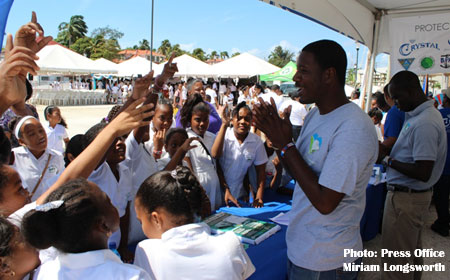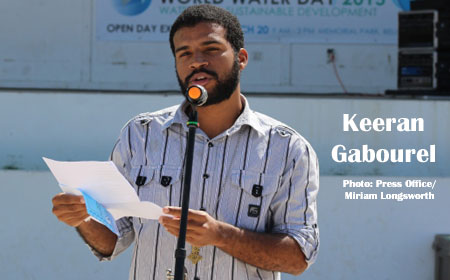BELIZE CITY, Fri. Mar. 20, 2015–World Water Day 2015 will be formally observed on Sunday, March 22, and this year, the theme is “Water and Sustainable Development”. Leading up to that observance, celebrations were held on Friday, March 20, at the Memorial Park in Belize City, where several booths featured displays and lots of information on the importance of water to Belize’s development.
City Councilor Bernard Pitts, Jr., said in his welcome remarks at Friday’s opening ceremony that Belizeans need to individually assess their own water consumption habits. If we are not diligent, we will find ourselves in a predicament, Pitts said.
“Water is life: let us all do our part!” Pitts said.
Entertainment during the opening ceremony came in the form of poetry from the top winners of the World Water Day 2015 Poetry Competition, which concluded on Wednesday, March 18, with live performances at the Brick Oven Sports Bar and Grill on King Street.
There were a total of 17 entries, and Keeran Gabourel walked away with the winning prize – one tablet with 6 months of 4G service plus $250 cash (sponsored by BTL & Crystal) – for his stellar piece, “Water Rush”. Melissa Hamilton walked away with the second place prize – one tablet plus $150 cash (Fultec & Crystal) – for her exceptional composition titled, “Life… Without Water?”
The poetry contest winners were recognized by keynote speaker, Sharon Ramclam, Chief Executive Officer in the Ministry of Natural Resources, which spearheaded the organization of the festivities.
Ramclam said that the day’s event was a major success because of all the major water stakeholders which participated. There were several agencies which shared the vital value of water with visiting students at information booths set up on the grounds of the Memorial Park. Among them were the Public Utilities Commission, the Hydrology Unit, the Ministry of Natural Resources, BECOL (which operates three dams on the Macal River), the Climate Change Center, the Solid Waste Management Project and the Belize Water Services.
Ramclam said that, “…this year’s theme is a reminder that it is important that we work together to ensure that our water resources are managed sustainably. After all, every living organism on planet earth requires water for survival.”
She underscored the need to focus on the vital role that water plays in our daily lives, as well as the need for stakeholders, including the wider community, to work together to achieve sustainability.
She shared some global facts about water, such as the fact that despite the abundance of clean water in some places, like Belize, there are still many people worldwide whose water is tainted with fecal contaminants.
“According to the WHO/UNICEF Joint Monitoring Programme for Water Supply and Sanitation, at least 1.8 billion people worldwide are estimated to drink water that is fecally contaminated. An even greater number drink water which is delivered through a system without adequate protection against sanitary hazards,” she noted.
She also noted that agriculture is the biggest water user, with irrigation accounting for 70% of global water withdrawals.
“The industrial and domestic sectors account for the remaining 20% and 10%, respectively, although these figures vary considerably across countries,” the CEO said.
Turning to some local facts, Ramclam informed that, “Belizeans consume between 240 -280 liters of water daily per person, which is as much as the industrialized countries: China, Japan, etc.”
Belize is in a good position, where water availability is concerned.

The CEO notes that “every day, there are at least 8,760 buckets (16 million gallons/year) of water available to each Belizean.”
In Belize, the amount of water we have available per capita – for each person here – is 14 times that available in Mexico, 100 times that available in Guatemala, 17 times that available in Jamaica and 1000 times that available in the Bahamas.
Ramclam explained that, “Water has and is always in the forefront of Belize’s development. Before the existence of our national road network, we used boats to ply our seas and traverse our rivers, to move between communities and to transport our harvested natural resources and produce to the markets. Today, Belize Sugar Industries still uses the New River to transport sugar produced at Tower Hill to the harbor in Belize City for exportation. The New River along with other rivers is the medium for most tourism activities – activities, such as cave tubing, canoeing, or river cruises and overnight stays at our riverside resorts. We have also developed hydroelectric potentials on the Rio Hondo, Belize River, and the Rio Grande.”
She also announced that her ministry is forging ahead with the implementation of the National Integrated Water Resources Authority.
“This process requires the cooperation of all, because if any of the people involved in water management do not cooperate, our water resources will not be managed in the most effective way, resulting in adverse effects on human lives and our rebounding economy,” she warned.
According to CEO Ramclam, the Ministry of Natural Resources partners with the Ministry of Health, the Department of the Environment, the Forest Department, non-government organizations, and other local water stakeholders to protect and conserve our water resources. It also partners with the Belize Weather Bureau to monitor and forecast floods and droughts and with the Belize Water Services and the Public Utilities Commission to ensure that water delivered to homes in Belize is safe, reliable and affordable.
It’s worth noting that there is an important relationship between water and energy: It takes 2,000 gallons of water to produce just one kilowatt of electricity.

